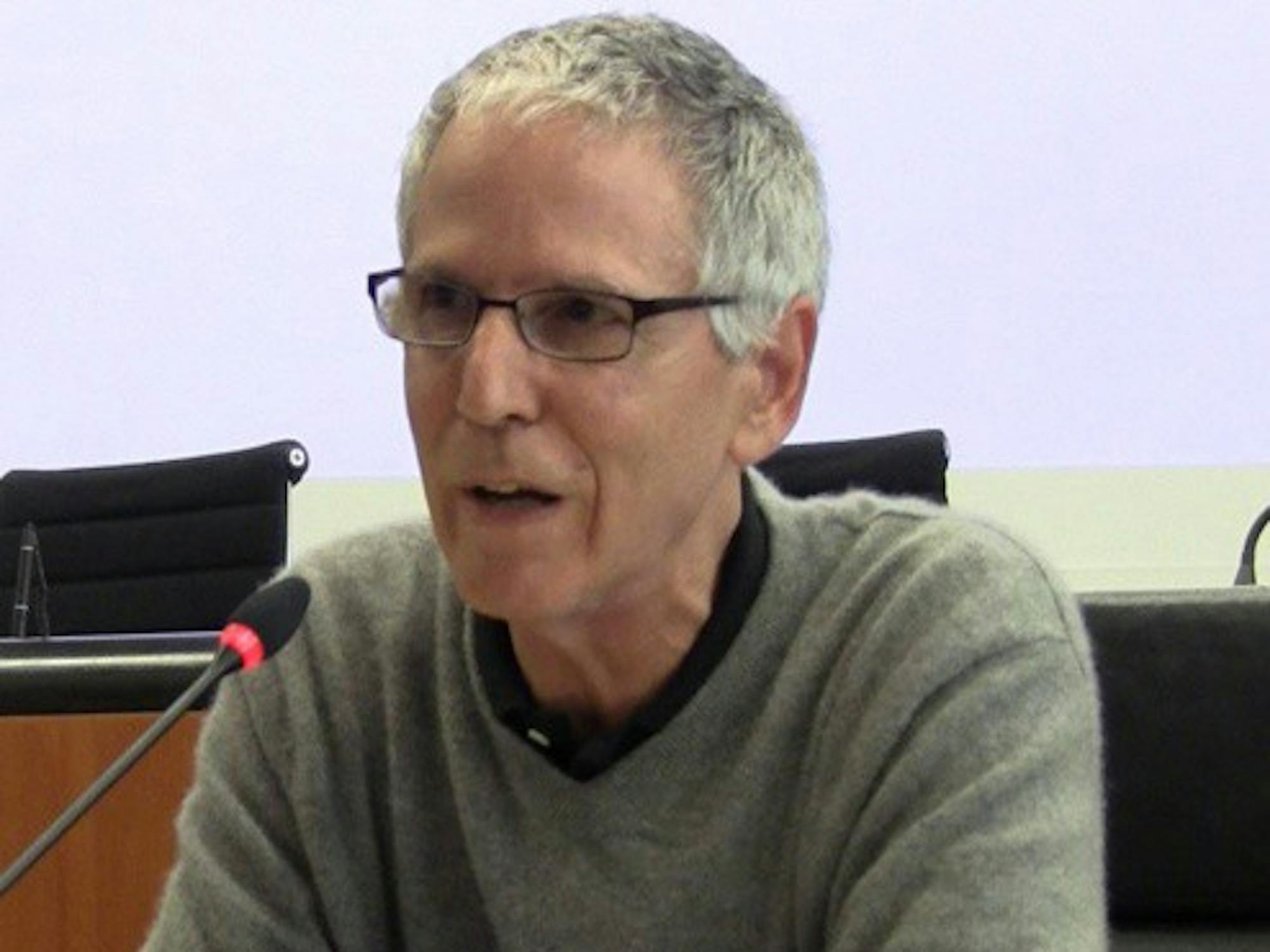Eastern Michigan University lecturer David Calonne’s biography on German-born American author and poet Charles Bukowski was released in the U.S. Sept. 15 as part of London-based publisher Reaktion Books’ Critical Lives series, which covers the works of leading modern cultural figures in art, writing and philosophy.
Calonne was born in Los Angeles, Calif. and earned his bachelor’s in ancient Greek from the University of California-Los Angeles and a doctorate in English from the University of Texas-Austin. He moved to Michigan in 1984 to teach at the University of Michigan and the University of Chicago, and has been teaching at EMU since 1999.
At EMU, Calonne has taught courses such as introduction to literature, introduction to fiction, Native American literature and writing about literature. He also worked for a year to create a Beat literature course, which was recently submitted for consideration to be added to EMU’s course offerings.
Calonne said he began collecting unpublished Bukowski writings in 1998, and between 2003 and 2011 he edited four books of works by Bukowski. Calonne said he’s been gathering material and doing research for his book, simply titled “Charles Bukowski,” for more than a decade and it took him roughly two years to write.
Calonne said being a child of the 60s and the questioning nature instilled in him by his parents was what sparked his interest in the counter-cultural Beat writers, and while Bukowski was not known as a Beat writer he ran in some of the same circles and was published in some of the same underground magazines as the Beats.
“There was such a division in the country between people who were for the war in Vietnam, with racism, with military stuff and in a way the counterculture — the Beat writers were part of a long American tradition, I think going back to [Henry David] Thoreau and [Ralph Waldo] Emerson, of people who were questioning that side of
America. They were criticizing it,” he said.
Calonne said he believes Bukowski felt he didn’t belong to the
privileged world of the Ivy League Beat writers.
“[Bukowski] grew up basically in poverty and the Beats were Ivy League … [Jack] Kerouac and [Allen] Ginsberg both went to Columbia [University] and [William S.] Burroughs went to Harvard. He just wasn’t in that set. He was more of a working-class guy, you know he worked for the post office, and I think he sort of saw those guys as spoiled,” Calonne said.
Bukowski was born Aug. 16, 1920 as Heinrich Karl Jr. in Andernach, Germany, but his parents moved to America when he was two years old. His childhood was difficult to say the least: He had an abusive father, suffered from severe acne, was dyslexic and felt isolated from his peers, who in Los Angeles during the 1920s post-First World War took exception to his German heritage. Kids called him “Heinie,” a derogatory term for Germans.
In a Jan. 14, 1963 letter to American novelist and poet John William Corrington, Bukowski wrote, “Between the imbecile savagery of my father, the disinterestedness of my mother and the sweet hatred of my playmates: ‘Heinie! Heinie! Heinie!’ things were pretty hot all around.”
Calonne said he enjoys Bukowski’s writing because it’s honest and shows the author’s perseverance through hardship.
“He was very funny, but he was just very raw,” Calonne said. “You know, ‘Here I am warts and all. I had this horrible childhood. I’m drinking all the time, but I’m writing. I’m engaged in this life-and-death struggle.’ I think I was very impressed by the heroism in that sense … All these terrible things happened to him and yet he didn’t give up.”
Calonne said Bukowski was absolutely obsessed with writing and supposedly wrote his first novel, “Ham on Rye,” in nineteen days.
“[Bukowski] also talked about writing as a way to sort of save himself from going crazy,” Calonne said. “He had such a difficult, emotional life that the only way he could channel all that craziness was by writing.”
In his book, Calonne said Bukowski’s “literary style was forged in the crucible of his youthful anguish: He would learn to handle words as if they were his fists, pounding back at the injustices he had endured. Writing became one means of fighting his way out, of steeling himself to avoid self-destruction. His skin had been removed: The emotional directness of his art had its source in naked, extreme vulnerability.”
Calonne said Bukowski spent his life attempting to undo the damage wreaked upon him through modes of indoctrination.
In a December 1988 piece appearing in Life Magazine, Bukowski wrote, “We are here to unlearn the teachings of the church, state and our education system. We are here to drink beer. We are here to kill war. We are here to laugh at the odds and live our lives so well that Death will tremble to take us.”
Calonne said he thinks Bukowski’s writing is quite accessible to readers, but some of his earlier poems could be very dense and naughty.
“What he’s famous for is that he’s a poet that people who don’t like poetry like, because his poetry is very direct … and it’s not written in a kind of phony-baloney language.”
Bukowski’s writing tended to portray the underbelly of urban life in America, and some of his favorite subjects included drinking, sex, gambling and music.
“That’s what’s funny about Bukowski,” Calonne said. “People read him and think, ‘Oh my God, he’s writing about drinking and about these terrible relationships and his horrible life.’ But if you read between the lines he’s always kind of trying to say something very sensitive and profound … I think he was trying to find the poetic meaning behind things in a way.”
Calonne said although Bukowski was relegated to the role of a quasi-literate, drunken womanizer by academia, he was widely read and intellectually curious.
“People who know about him … they know that he was this sort of wild man. They know about his crazy life. They often don’t know about his writing and so I was trying to show how literary he was … he was influenced by all these great writers,” Calonne said. “That was what I was trying to accomplish [in writing this book] is treat him as a writer and not just as this wild man. Not just the life but the writing.”
And Calonne does just that, by documenting the who, what, where and when of many of Bukowski’s publications, effectively walking the reader through a chronology of his literary career.
In a March 14, 2005 article for The New Yorker, literary critic Adam Kirsch said, “Bukowski’s poems are best appreciated not as individual verbal artifacts but as ongoing installments in the tale of his true adventures, like a comic book or a movie serial. They are strongly narrative, drawing from an endless supply of anecdotes that typically involve a bar, a skid-row hotel, a horse race, a girlfriend, or any permutation thereof.”
Bukowski died March 9, 1994 in San Pedro, Calif. of myelogenous leukemia at the age of 73. The prolific writer left behind an oeuvre of thousands of poems, hundreds of short stories, six novels and more than 60 books, and more collections of his work are regularly being gathered and released posthumously.
As an odd testament to Bukowski’s continued popularity, his books rank as the most stolen books from bookshops, according to Calonne.










